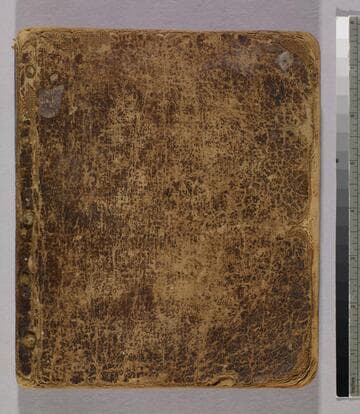Manuscripts
Orderly book for Anthony Wayne's brigande
Image not available
You might also be interested in

Orderly book of Anthony Wayne, 1781, Sept. 28 - Nov. 2, Yorktown, Va
Manuscripts
Brigade orderly book of Anthony Wayne's command during the Yorktown campaign
mssHM 619

Orderly book, 1761
Manuscripts
The orderly book was kept by John Grant of Archibald McNeil's company in the 2nd Connecticut Regiment. Kept between June 20 and October 17, 1761, this orderly book pertains to the British occupation of Crown Point, N.Y. Also contains miscellaneous accounts, verses, and memoranda to 1801.
mssHM 595
Image not available
Orderly books of Joseph Bloomfield
Manuscripts
Orderly books kept by aides-de-camp to Joseph Bloomfield from June 12 to July 28, 1812 (ff. 1-19v) and Oct. 29, 1812 to Apr. 8, 1813 (ff. 24-174 v., written from back forward). Entries made by R.T. McPherson, Robert Sterry, William King, David Biddle, and Charles W. Hunter. Also included general orders issued by Alexander Smyth, Army Inspector General, from Sept. 7 to 17, 1812 (ff. 20-23v).
mssHM 672
Image not available
James McMahan orderly book
Manuscripts
This volume is the day-to-day record of the 2nd Pennsylvania Battalion during Henry Bouquet's 1764 Ohio campaign during the Pontiac War, also known as Pontiac's Conspiracy. It documents military orders, records of court martial, announcements, encounters with women following the troops, French prisoners of war, Indigenous hostages, interactions with local Indigenous groups, and life at Fort Pitt, Pennsylvania, following a siege by allied Indigenous warriors. After McMahan returned home in December 1764, he used the orderly book to keep personal accounts. The sporadic records cover 1765 to 1772 and include transactions involving purchases of whiskey, shoes, "Bedsteads, "dear skins," lead, sugar, salt, and books, as well as payments to day laborers and artisans.
mssHM 84495